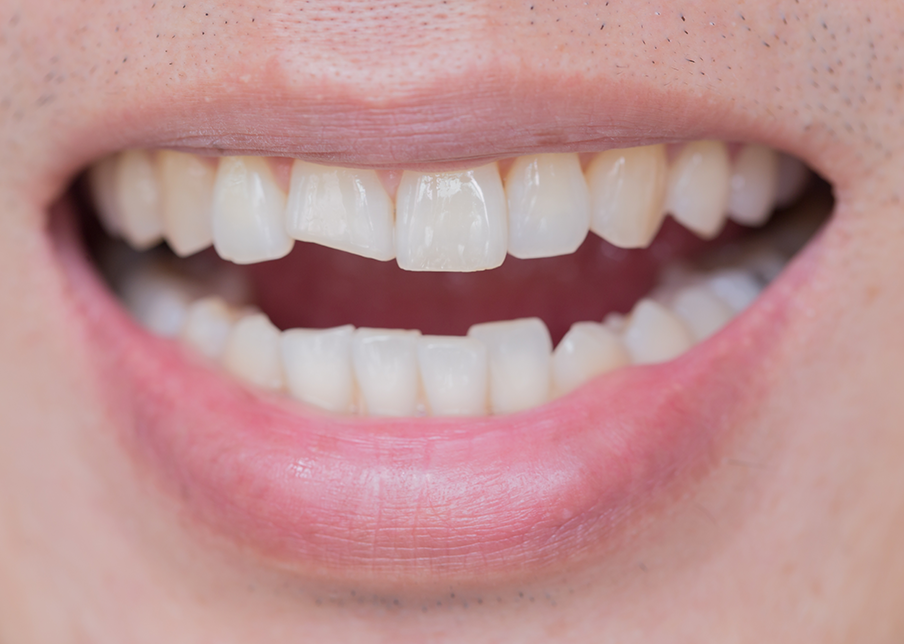
Problematic grinding and clenching left untreated, can potentially lead to permanent damage

Generally developed in the back teeth it can also effect front teeth if they suffer from an accidental knock or break, cracked tooth syndrome refers to symptoms resulting from a cracked crown or tooth root.

As the crack in the tooth develops, it will expose the layer of tooth below the enamel called the dentine. This layer protects the small nerves known as the pulp. As more pressure is exerted against the tooth, the crack opens and causes the fluid to move. As the biting pressure is released, the crack pushes closed and the nerve is stimulated to cause pain.
An obvious on is to make sure that when doing high contact sports especially if you have children make sure you and your children are wearing protective mouth guards.
Try to monitor your clenching and grinding habits – maybe some relaxation exercises could be helpful so you have a less harmful outlet for stress.
Also stay away from hard foods and objects as chewing ice and pens can severely damage the outer layer of tooth and result in costly surgery.
If you suspect you’ve been grinding your teeth at night, ask your Family Dental Clinic – West End dentist about a night guard and take a look at our nocturnal grinding page, because your oral health is our highest priority.
In severe cases where the crack has made the pulp inside the root of the tooth become infected, root canal therapy may be required. As the crack develops, you may notice the tooth becoming more sensitive to hot and cold foods and liquids. Untreated cracks can eventually spit the tooth down through the root and may require being extracted.
If you feel that you may have a cracked tooth, book an appointment with one of our professionals at Family Dental Clinic – West End and see how we can help nurture your teeth back to health.



Our photo galleries at Family Dental Clinic – West End all contain genuine patients that have undergone one or more than one of general dentistry, cosmetic dentistry or restorative dentistry treatments. Every image of before or after photos are true and correct, all having been performed in the West End practice located in Brisbane.






Dedicated to creating beautiful healthy smiles using the latest dental technology with precision and care
The best treatment for cracked tooth syndrome depends on the severity of the crack, with options ranging from dental bonding and dental crowns for minor cracks, to root canal treatment for cracks that extend into the pulp causing severe pain. In some cases, occlusal adjustments, nightguards, or splints might be used to relieve pressure and prevent further damage. If the crack is extensive and the tooth cannot be saved, extraction might be necessary, followed by tooth replacement options like dental implants or bridges. Prompt evaluation and diagnosis by a dentist are essential to determining the most suitable treatment approach based on the individual’s specific situation.
Cracked tooth syndrome can affect any tooth, but certain teeth are more commonly affected due to their anatomy and the forces they experience during chewing. The teeth most commonly affected by cracked tooth syndrome are the molars, particularly the lower molars. This is because molars have multiple cusps and are used for chewing and grinding food, which subjects them to significant biting forces. Additionally, the location of the molars in the back of the mouth can make them more susceptible to cracks as they bear the brunt of chewing forces. However, cracked tooth syndrome can also affect other teeth, including premolars and even occasionally incisors, especially if there’s a history of trauma, grinding, or clenching. If you suspect you have cracked tooth syndrome or are experiencing dental pain, it’s important to consult a dentist for an accurate diagnosis and appropriate treatment.
Cracked tooth syndrome is typically caused by a combination of factors, including biting forces, bruxism (teeth grinding and clenching), large fillings, trauma, age-related changes, temperature fluctuations, inconsistent bite, previous dental procedures, weakened enamel, and anatomical characteristics. These factors can lead to the development of small cracks in the teeth, resulting in pain, discomfort, and sensitivity during chewing, biting, or exposure to temperature changes. Prompt evaluation by a dentist is crucial to diagnose and address cracked tooth syndrome, as early intervention can prevent further damage and provide effective treatment to alleviate symptoms.
I received absolutely fantastic care from Dr. Georgio and his assistance today. Also was greeted by a very kind reception team. Thanks for the great work team, I look forward to coming back!
Dr Kosta did great work on both my crowns and there was very little discomfort after the second one. Very happy with the service as well from the rece… Read More
Kosta was very good, explaining exactly what my options were and ensuring my comfort all through the procedure. He gave me an aftercare sheet detailin… Read More
Top rate care, compassion, warmth & professionalism. This was my second visit & it’s a relief to find a team so good. Thoroughly recommend Dr Costa & … Read More
I had Dr. Giorgio, he is very kind, gentle, and efficient. He made my teeth look perfect. All the staffs are very friendly.